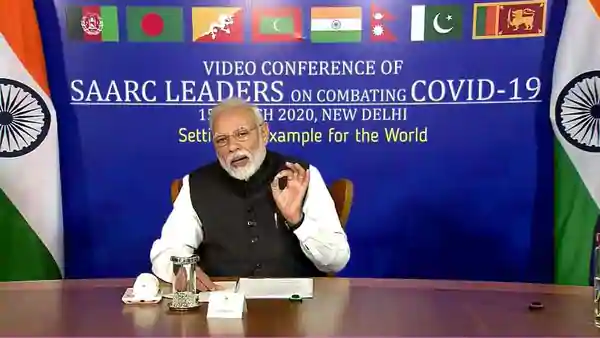SAARC officials consent to focus on larger framework to improve intra-region trade

Collected
Seven countries of South Asia on Wednesday decided to look at methods to maintain trade flows within the spot in a bid to counter the adverse impact that the covid-19 pandemic could have on regional commerce, a statement from the Indian foreign ministry said.
Trade and commerce officials of Afghanistan, Bhutan, Bangladesh, Maldives, Nepal and Sri Lanka besides India held talks over a video link to take stock of the situation following the outbreak of the pandemic that has caused countries to close borders, brought commercial passenger happen to be a standstill, caused oil prices to crash and stock markets to plummet.
Pakistan was the notable absentee from Wednesday’s meet, the Indian statement said of the function that was a followup to a video conference among the heads of governments from the South Asian Association for Regional Cooperation (SAARC) last month. At the heads of government event too, Pakistan was represented by the official - given tensions with India over the decades old dispute over Kashmir.
“It had been recognized that the Covid-19 pandemic will probably have a considerable adverse effect on trade in the SAARC region. To ensure that the countries to manage the situation, it had been stressed that new ways and means be jointly discovered to sustain and expand the intra-regional trade before normal trade channels are fully restored," the statement said.
“The imperative have to maintain essential trade within the SAARC region was seen as an important thrust area for favourable consideration," it said.
Some specific steps addressed during the video conference meet included “facilitation of trade through pragmatic solutions such as for example provisional clearance of imports at preferential duty with suitable conditions, provisional acceptance of digitally signed certificates of origin, acceptance of scanned copies of documents for clearance of imports by customs and release of payments by banks, resolving issues being faced for exports/imports at land customs stations on land border," the statement said.
“The impact of medical issues such as for example Covid-19 on regional trade and possible measures to mitigate it were regarded as a new focus area for discussion in the bigger framework of trade facilitation in the SAARC region. The necessity to improve the quantum of intra SAARC trade was also highlighted," the Indian statement said.
Meanwhile, a Pakistan foreign office statement made available by its high commission in New Delhi said Islamabad thought we would stay away from Wednesday’s meet because the SAARC Secretariat was not part of it.
“Being truly a founding member, Pakistan believed that SAARC provides an essential platform for regional cooperation," the Pakistan statement said.
“The role of the Secretariat assumes further salience in emergency conditions including the Covid-19 pandemic, and its wider social and economical fall-out. As in the case of other regional and international organizations, SAARC Secretariat also supplies the requisite convening platform, institutional framework and support structure for essential coordination and follow-up," it said.
“Activities such as for example today’s Trade Officials’ Video-Conference could only be effective if spearheaded by the SAARC Secretariat. Because the SAARC Secretariat had not been part of today’s Video-Conference, Pakistan chose not to participate," the Pakistani statement added.
Created in the mid 1980s, SAARC has little to show for itself considering that progress on issues like regional integration and connectivity has been slow due mainly to infighting between India and Pakistan. Pakistan was to host a summit of SAARC leaders in 2016 but India, Afghanistan, Bhutan and Bangladesh pulled out citing Pakistan’s support to terrorism as not conducive for regional cooperation. No summit of SAARC has been held since.
Source: https://www.livemint.com